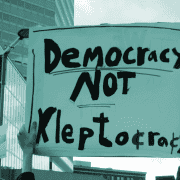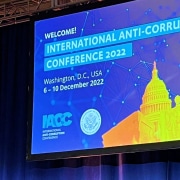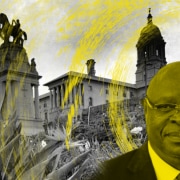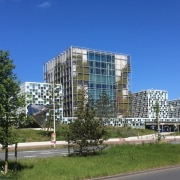|
Getting your Trinity Audio player ready...
|
Image: UNDP
As was the case with the preceding events in the International Anti-Corruption Conference (IACC) series, the 2022 event, held in Washington DC in early December last year, brought together a diverse group of people from around the world, all with a common interest – to expose and stop corruption. Over 2 000 heads of state, representatives from civil society, business leaders, investigative journalists, and others – as well as a big online audience – participated in an exhilarating programme hosted by Transparency International in partnership with the US Department of State, under the these of Uprooting Corruption, Defending Democratic Values.
The conference ended with the release on 12 December of the Washington Declaration – read it here.
Corruption Watch’s executive director Karam Singh contributed to the 20th IACC as a panellist on a session titled Winning the kleptocratic war: How can international cooperation and development cooperation support the fight against kleptocrats and oligarchs? Singh was accompanied on the panel by Zuzana Wienk of the Slovakia Open Government Partnership’s (OGP) steering committee, Johannes Ferguson, head of the Competence Centre for Public Finance and Public Administration at the Deutsche Gesellschaft für Internationale Zusammenarbeit (GIZ), Global Witness founder Patrick Alley, and Veronica Dragalin, chief prosecutor of the Anti-Corruption Prosecutor’s Office in Moldova.
The session aimed to answer questions such as which anti-kleptocracy measures are most effective, how can the international community support those engaged in fighting kleptocracy, and what should donors and technical assistance providers consider when they plan interventions targeted at fighting kleptocrats.
The moderater was Anna Sturmfels. GIZ’s planning expert on anti-corruption. The session took place under the IACC’s Stream 6: Fighting greed, kleptocrats, oligarchs and cracking down on money laundering and the enablers, which focused on topics such as illicit finance, beneficial ownership transparency, secrecy jurisdictions, legal loopholes, and grand corruption.
Kleptocracy a global problem
There are many definitions of the concept of kleptocracy, but they all point in the same direction – as the Cambridge dictionary states, ‘a society whose leaders make themselves rich and powerful by stealing from the rest of the people.’
The term derives from the Greek κλέπτης kléptēs, “thief”, κλέπτω kléptō, “I steal”, and -κρατία –kratía from κράτος krátos, “power, rule”.
In South Africa, the state capture era encapsulates what kleptocracy is all about, and how devastating its effects can be. Grand corruption and kleptocratic goings-on during the Zuma era reached unprecedented heights, and the main beneficiaries – though there were numerous others – were the unscrupulous Gupta family, cronies of the pliable former president Jacob Zuma.
Singh emphasised that state capture did not start and end with Zuma, as grand corruption also happened under South Africa’s first democratic president Nelson Mandela. Even before then, research has shown, it was entrenched in South Africa’s political systems and is described by Prof Steven Friedman as “the country’s oldest tradition”.
The multi-part report of the four-year Zondo commission of inquiry into state capture gives a detailed outline on how state capture functioned in the country over the years, said Singh. Despite the commission’s broad terms of reference, it did not cover state capture at the provincial and local levels of government, homing in rather on the Guptas’ improper conduct, the capture of procurement systems and key oversight institutions such as prosecution, police, revenue service, and the role of the governing party and key enablers.
“The commission was a result of whistle-blower action and a very determined civil society asking for accountability,” said Singh. In terms of consequences, he added, “it is important to note that the findings and recommendations of the report are not binding.”
The various parts of the report have been in official hands since January 2022, and follow-up action has been slow though a few firms have been sanctioned. Government presented its response in October 2022, but it contains little immediate comfort for South Africans crushed by the extreme levels of corruption – the contents refer mostly to which government body is looking into which aspect of the report.
Nevertheless, Singh sees a window of opportunity for reform with the current government, and for him the key is transparency, particularly in procurement, as it is impossible to develop solutions in the absence of data to work with. Government could take practical steps such as strengthening oversight bodies, enhancing protection for whistle-blowers, and bringing civil society on board.
Transparency is also a key feature for Zuzana Wienk, who said that effective transparency reforms are crucial. “By providing citizens and the media with information one makes them part of the system of checks and balances of a country.”
This is where GIZ can assist, said Johannes Ferguson. “It supports partners in implementing a holistic follow-the-money approach – this means increasing transparency, strengthening the prevention of corruption and illicit financial flows, financial investigation and asset recovery … it is very important to also strengthen financial investigation and asset recovery through capacity building of key institutions, but also by supporting inter-agency cooperation. For example, GIZ supported the introduction of the Multi-Agency Teams in Kenya, after which Kenya recovered record sums of illegal assets.”
Rich countries part of the problem
Prof Jason Sharman, of Cambridge University’s Department of Politics and International Studies, views kleptocracy as a specific form of corruption in its own right, one which occurs “when state leaders, generally from poorer countries, routinely loot millions or even billions of dollars from their national treasuries”.
That stolen money is very likely to be spent or stashed in rich countries, Sharman adds, “and until very recently, rich countries had no moral or legal obligation to do anything about these flows of dirty money.”
These international kleptocratic networks are populated by a host of accomplices, including accountants, bankers, real estate agents, and luxury goods brokers, among others.
The Global North is part of the global kleptocratic system and should not be seen separate from it, said Patrick Alley, with illicit financial flows moving from target countries and often ending up in the big financial centres of the Global North.
He said that more attention should be focused on the enablers of kleptocracy. “We know what company registration agents, accountants, and lawyers are doing to exploit loopholes and facilitate corruption and other financial crimes, and how they are directly attacking accountability actors such as investigative journalists. But not enough is being done to stop them.”
Alley called for an end to impunity for individuals who enable businesses, professions, and enterprises engaging in corruption. Financial sanctions alone on firms are of little use, he added, as these are simply built into the cost of doing business.
Political will is key
A lot depends on political will, said Veronica Dragalin, and in her country’s case, its new government has placed the fight against corruption at the top of the political agenda.
“This change builds on years of Moldovan grassroot activism and the electoral will of the people.”
Moldova focused first on addressing the capture of its justice system. This capture enabled the theft of Moldovan resources and is generally one of the biggest challenges in fighting kleptocratic structures, because it virtually guarantees immunity for criminals.
South Africans will recall with disgust how their justice system was compromised during the state capture era by appointing weak and compliant leadership in the National Prosecuting Agency, the Hawks, and the South African Police Service. A joint submission made in April 2019 by the Institute for Security Studies (ISS) and Corruption Watch to the Zondo commission found, among others, that organised crime flourished under Zuma’s presidency as South Africa’s criminal justice agencies were manipulated for political and personal gain.
Interference in these three bodies helped to entrench state capture, the submission noted, ensuring impunity for Zuma, his political and business allies, and their deep-rooted patronage networks.
The Moldovan approach involved an innovative vetting system that involves foreign partners for the appointment of judges and public prosecutors.








